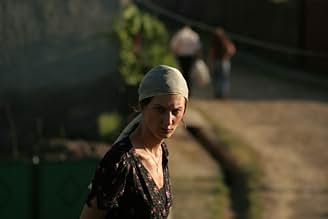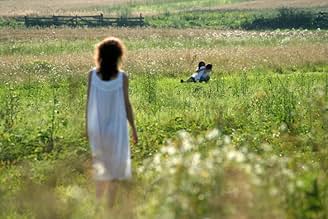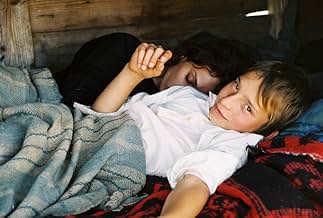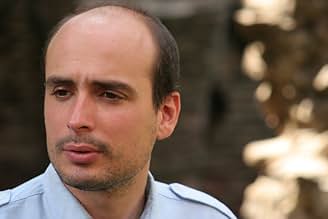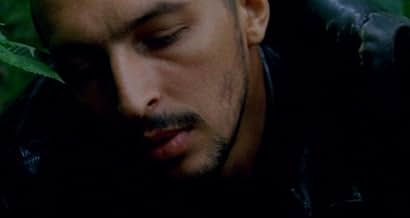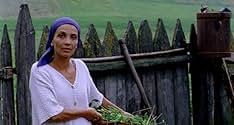Katalin Varga
- 2009
- 1h 22min
VALUTAZIONE IMDb
7,0/10
3164
LA TUA VALUTAZIONE
Aggiungi una trama nella tua linguaKatalin, a woman raped in the Carpathian Mountains, seeks revenge with a boy, questioning morality's complexities as she confronts her past.Katalin, a woman raped in the Carpathian Mountains, seeks revenge with a boy, questioning morality's complexities as she confronts her past.Katalin, a woman raped in the Carpathian Mountains, seeks revenge with a boy, questioning morality's complexities as she confronts her past.
- Premi
- 14 vittorie e 16 candidature totali
Tibor Pálffy
- Antal Borlan
- (as Tibor Pálfy)
Recensioni in evidenza
Obviously filmmaker Strickland has a special interest in women's world. Hilda Péter is simply brilliant as the strong willed woman, giving it a mythical inner power and carries the whole show. Shot in 17 days, the movie has the stamp of a genius inspiration. I think it would easily be considered masterpiece in case it was part of a grander philosophical undertaking.
Peter Strickland's debut movie Katalin Varga reminds me very much of another recent British film, Asif Kapadia's 2007 effort Far North, which is also a folk horror story about an outcast and her child. Stickland uses the dank forest of Romania instead of the perilous ice flows of the north, but the movies are birds of a feather, low budget movies intended to tap primal energies.
Children run away from Katalin Varga, a darkly pretty woman with live-wire eyes, who's altogether too spirited to remain unmolested in the time-capsuled world with which the movie presents te viewer. Folk have mobile phones, but Katalin still travels by horse-drawn cart, and men still make hay in the fields with pitchforks. Gossip in Katalin's village is poisonous enough to make Clouzot's vision in Le Corbeau appear positively made of marshmallow. Following the repurcussions of gossip regarding Katalin's past, she travels with her child into an apparently infrastructure-less hinterland on a dark mission, like black lightning.
It's no surprise to find, following shot after shot of foreboding nature scenes, that this is a tragedy, in a cul-de-sac structure similar to Monte Hellman's brilliant 1965 movie Ride in the Whirlwind.
It's a brutal movie, in structure rather than in screen violence, which there is remarkably little of, and which is generally obscured in incoherence when it occurs. It's almost senseless and left me with a directionless primitive anger.
Children run away from Katalin Varga, a darkly pretty woman with live-wire eyes, who's altogether too spirited to remain unmolested in the time-capsuled world with which the movie presents te viewer. Folk have mobile phones, but Katalin still travels by horse-drawn cart, and men still make hay in the fields with pitchforks. Gossip in Katalin's village is poisonous enough to make Clouzot's vision in Le Corbeau appear positively made of marshmallow. Following the repurcussions of gossip regarding Katalin's past, she travels with her child into an apparently infrastructure-less hinterland on a dark mission, like black lightning.
It's no surprise to find, following shot after shot of foreboding nature scenes, that this is a tragedy, in a cul-de-sac structure similar to Monte Hellman's brilliant 1965 movie Ride in the Whirlwind.
It's a brutal movie, in structure rather than in screen violence, which there is remarkably little of, and which is generally obscured in incoherence when it occurs. It's almost senseless and left me with a directionless primitive anger.
I missed this first time round and am so glad I caught up with it at an afternoon showing at a local independent cinema. Even more encouraging was that I expected to be the only person there but, although only a smattering of people (in a large auditorium), there were enough to create an atmosphere (that may be in my head but hopefully some people will get what I mean). So, transfixed by Hilda Peter from the outset, the film moved beautifully through dreamy countryside as the revelation of a hidden secret drove Katalin and her son away from their marital home. The menacing undertone haunted their journey to remote villages, the audience waiting for the inevitable vengeance to erupt. The nature of the film and its brutal climax prompted something I love to see as the credits rolled. No one moved or spoke. If the audience is out of their seats the second the picture fades I feel either they're relieved the film has finished or have weak bladders or a drink problem. Katalin Varga was successful in conquering the audience, an endorsement of its quality. See it.
When the husband of the eponymous Katalin Varga learns that he is not the father of their ten year old son, Orban, he throws her out and demands that she leaves their village. She departs with Orban, telling him that they are going to see his sick grandmother. She has other plans though; Orban wasn't the result of an infidelity but of rape and now she intends to have her revenge. This is something that will have unintended consequences and put her in danger.
Usually when revenge is the subject of a film there will be lots of action before a righteous avenger slays the villainous character who wronged them. This is very different; there is little in the way of action but that is more than made up for in atmosphere. The rural Romanian setting is beautiful and in turns idyllic and oppressive depending on the location and even the weather. This is a world where ancient meets modern; Katalin travels in a horse drawn cart but characters have mobile phones. Hilda Péter does a great job as Katalin, a character who is rarely off screen; the scene where she talks about what happened to her is particularly effecting. The supporting cast are solid too; most notably Tibor Pálffy who plays the man she most wants revenge against... a character that is more sympathetic than one might expect. Overall I'd definitely recommend the melancholically beautiful film.
Usually when revenge is the subject of a film there will be lots of action before a righteous avenger slays the villainous character who wronged them. This is very different; there is little in the way of action but that is more than made up for in atmosphere. The rural Romanian setting is beautiful and in turns idyllic and oppressive depending on the location and even the weather. This is a world where ancient meets modern; Katalin travels in a horse drawn cart but characters have mobile phones. Hilda Péter does a great job as Katalin, a character who is rarely off screen; the scene where she talks about what happened to her is particularly effecting. The supporting cast are solid too; most notably Tibor Pálffy who plays the man she most wants revenge against... a character that is more sympathetic than one might expect. Overall I'd definitely recommend the melancholically beautiful film.
Great, atmospheric effort from Strickland. I can only imagine he had some affinity with this part of Romania whether from childhood or other. The soundtrack and some of the slow lingering shots (esp. the scene looking at child, mother and horse not moving from behind, and the forest shot) were very affecting, and reminded me of Tarkovsky (not in a bad way ;)I got to thinking of the inextricable nature of all things, of how everything (as a single glorious 'entity') was so deviously and religiously bound up that to even attempt to extract something from it was tantamount to destructuring the whole (and thus destroying its royalty). That a film can inspire me (it has to be said not single-handedly)to such ends is indicative of a deep metaphysical quality within it.There is a particular sentence that the man utters towards the end of the film that resonates deeply towards this metaphysis. I shan't explicate it, nor even repeat it, but you shall know it when you hear it.
Thanks for this Strickland, and all who were involved in and outside it (even the guy who carted the extra film stock when, presumably, you ran out ;) 'Ultimately, there are no parts at all.' Fritjof Capra, The Web of Life.
Thanks for this Strickland, and all who were involved in and outside it (even the guy who carted the extra film stock when, presumably, you ran out ;) 'Ultimately, there are no parts at all.' Fritjof Capra, The Web of Life.
Lo sapevi?
- QuizThe film was shot in Romania in July 2006 for around £25,000 with a small crew of 11 people (including transport and catering). Strickland paid everyone on the 17-days-shoot himself, apart from the focus-puller, who agreed to work for free. The whole crew and the actors lived together in an empty house in a small village in the Carpathian Mountains. After the shoot Strickland ran out of money while editing. He approached many UK production companies, but the reaction was always negative because an obscure film by an unknown director, not even in the English language, seemed to put off all UK investors. Only two Romanian producers, Oana Giurgiu and Tudor Giurgiu, paid attention. They saw Strickland's rough cut and came on board as co-producers, providing the funds to make a proper sound-mix and a blow-up from the Super-16mm negatives to 35mm. It was then invited and shown in competition at the '59th Berlin International Film Festival' in 2009 and won the 'Outstanding Artistic Contribution' award for the creative sound design. Without the Romanian producers, the film would never have been properly finished.
- ConnessioniReferenced in Cowboy (2017)
- Colonne sonoreThe Grave and Beautiful Name of Sadness
- excerpts taken from "The Sadness of Thing"
Written by Steven Stapleton and David Tibet
Performed by Steven Stapleton and Geoff Cox
I più visti
Accedi per valutare e creare un elenco di titoli salvati per ottenere consigli personalizzati
- How long is Katalin Varga?Powered by Alexa
Dettagli
- Data di uscita
- Paesi di origine
- Sito ufficiale
- Lingue
- Celebre anche come
- 卡塔琳的秘密
- Luoghi delle riprese
- Aziende produttrici
- Vedi altri crediti dell’azienda su IMDbPro
Botteghino
- Lordo in tutto il mondo
- 28.399 USD
- Tempo di esecuzione1 ora 22 minuti
- Colore
- Mix di suoni
- Proporzioni
- 1.85 : 1
Contribuisci a questa pagina
Suggerisci una modifica o aggiungi i contenuti mancanti



